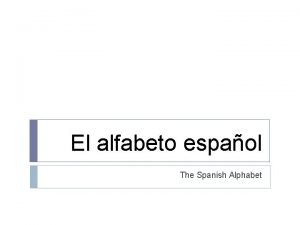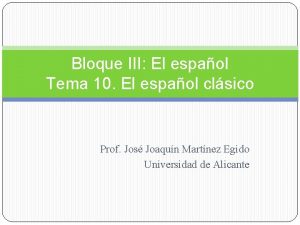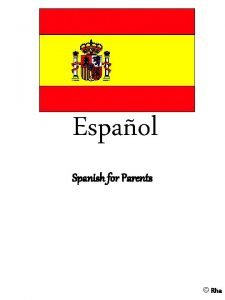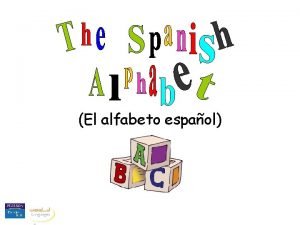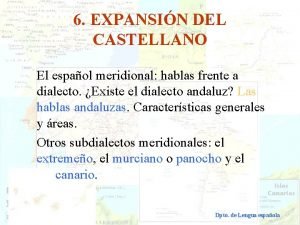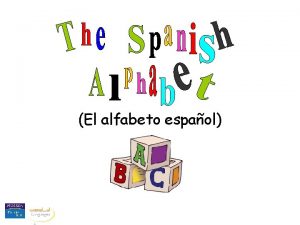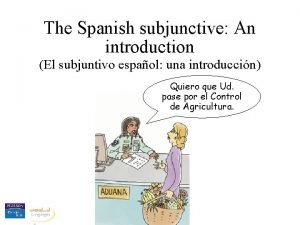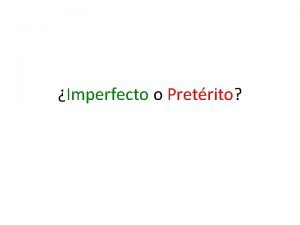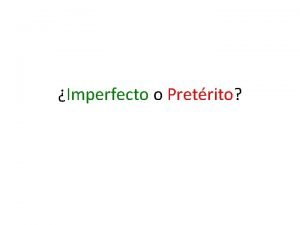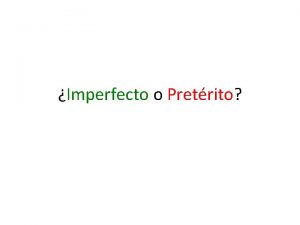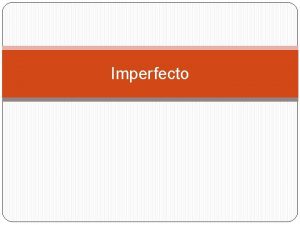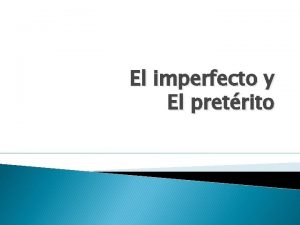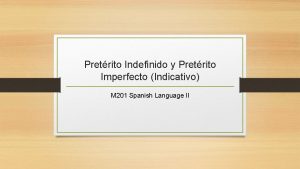El Pretrito vs El Imperfecto Espaol III El















- Slides: 15

El Pretérito vs. El Imperfecto Español III

El Pretérito

El Pretérito • regular verbs • -car, -gar, -zar verbs – “yo” form • c → qu • g → gu • z→c • i→y – 3 rd persons only – -er/-ir verbs only – end in a vowel • -ir stem changing verbs – 3 rd persons only – e→i – o→u • irregular verbs – 13 verbs

Palabras Claves del Pretérito • • • ayer anteayer anoche anteanoche la semana pasada el fin de la semana pasada el lunes pasado el mes pasado el año pasado el otro día esta mañana hace (10) días, meses, años yesterday before yesterday last night before last weekend last Monday last month last year the other day this morning 10 days, months, years ago

El uso del pretérito • Expresses: Ø an action that takes place at a definite time in the past and the action is completed/over.

El Imperfecto use o t d was /we re ( -ing “wo ) uld”

Imperfect – 3 verbos irregulares IR – to go SER – to be VER – to see iba era veía ibas eras veías iba era veía íbamos éramos veíamos ibais erais veíais iban eran veían

Palabras Claves del Imperfecto • • • • siempre nunca todos los días cada día cada dos días cada semana cada fin de semana frecuentemente generalmente usualmente a veces muchas veces por muchos años de vez en cuando always neveryday each day every other day each weekend frequently generally usually at times; sometimes many times for many years from time to time

El uso del Imperfecto • Expresses action in the past that: Ø has not been completed Ø occurred habitually / frequently Ø took place over an indefinite period of time

El uso del Imperfecto • Expresses action in the past that: Ø includes feelings Ø talks about time Ø age Ø date Ø gives background information Ø describes in general: people, places, scenes, feelings, customs, traditions

Diferencias • The preterite tells specifically when an action took place. – Example: Yo fui a la escuela por doce años. • The imperfect tells generally when an action took place. – Example: De niño, yo iba a la escuela.

Diferecias • Some verbs change meaning depending on whether the preterite or the imperfect is used. They are

Imperfecto Pretérito • • • conocer querer no querer saber poder tener = met = tried = refused = found out = succeeded in = received • • • conocer querer no querer saber poder tener = knew = wanted = did not want = knew = was able to = used to have

Diferencias • In some situations the speaker may use either the preterite or the imperfect. In this case, the meaning of the sentence changes slightly from preterite to imperfect. Ejemplos: El chico estaba enfermo. The boy was sick. El chico estuvo enfermo. The boy was sick (but is now better).

Works Cited • Constructive World of Advanced Spanish, The, Program 6: The Preterite and Perfect Tenses. Standard Deviants (2002). Retrieved May 10, 2007, from unitedstreaming: http: //www. unitedstreaming. com/ Imperfect & Preterite Tense Segments: http: //www. unitedstreaming. com/search/asset. Detail. cfm? guid. Asse t. ID=002 EF 67 A-E 80 C-4863 -B 50 C-79 A 3 E 7 F 52152 • Imperfect. Retrieved May 10, 2007, from About Spanish Language Web site: http: //spanish. about. com/library/glossary/bldefimperfect. htm • Preterite. Retrieved May 10, 2007, from About Spanish Language Web site: http: //spanish. about. com/library/glossary/bldefpreterite. htm
 Pretrito
Pretrito Hamlet act iii scene ii
Hamlet act iii scene ii Military alphabet in spanish
Military alphabet in spanish Codigo penal espaol
Codigo penal espaol Trabajos en espaol birmingham
Trabajos en espaol birmingham El espaol
El espaol Citizenship test en espaol
Citizenship test en espaol Puntos cardinales mapa españa
Puntos cardinales mapa españa Abecedario espaol
Abecedario espaol Idioma espaol
Idioma espaol Preguntas de miguel hidalgo con respuesta
Preguntas de miguel hidalgo con respuesta Letras consonantes
Letras consonantes Español meridional
Español meridional Espaol
Espaol Espaol
Espaol Preguntas de ciudadania en espaol
Preguntas de ciudadania en espaol


